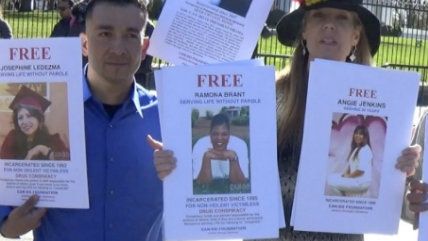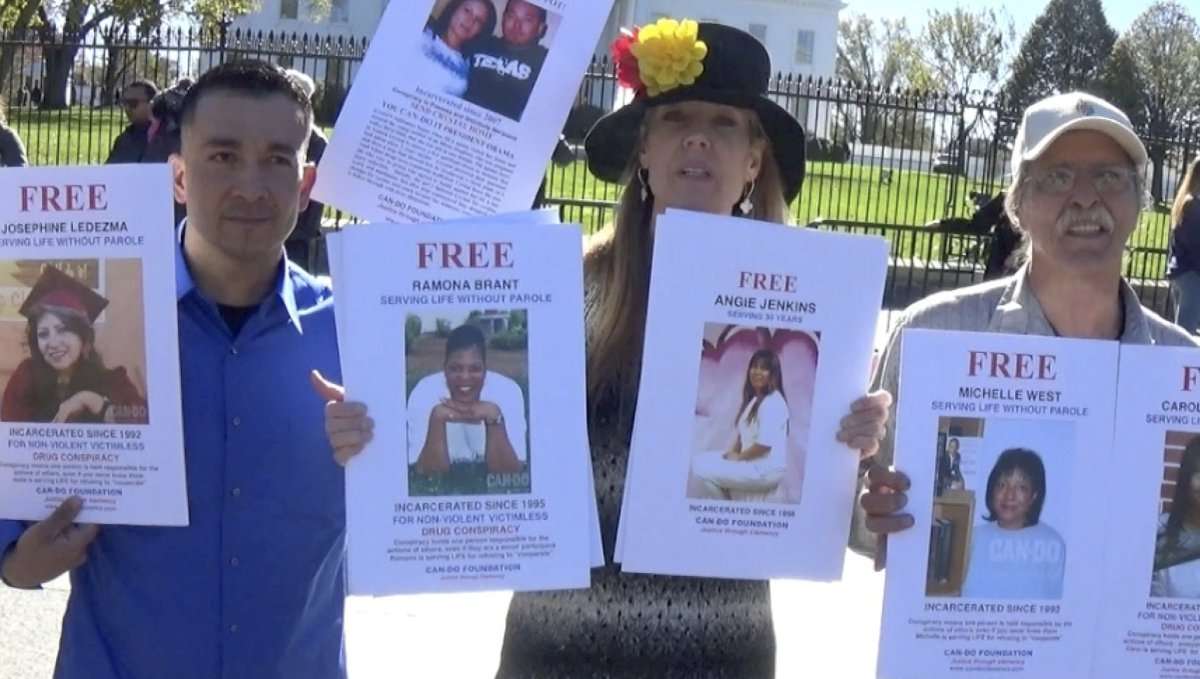How Conspiracy Laws Let Prosecutors Abuse Their Power
Any meaningful criminal justice reform must include a reexamination of these draconian policies.


Amy Povah was just 30 years old when she was sentenced to 24 years in federal prison for a drug crime she didn't even commit herself. The crime—manufacturing a large amount of ecstasy in both the United States and Germany—was committed by her then-husband, Sandy Pofahl. Her lengthy prison sentence was based on the entire amount of ecstasy Pofahl manufactured, even though five co-defendants provided affidavits stating Amy was not involved in his drug trade.
Because Pofahl cooperated with the U.S. prosecution by providing the government with information about other drug dealers, he walked away with just three years probation in the U.S. after serving four years in a German prison. Povah, meanwhile, refused to cooperate with the federal investigation into her husband's crime and, as a result, was indicted for conspiracy. The charges came with a mandatory 20-year to life sentence in federal prison. She was convicted in 1991.
Charlie Strauss, an assistant U.S. attorney from Waco, Texas who had initially questioned Povah, told Glamour magazine in 1999, "Had she come to the table at that time—cooperated, been truthful, honest and candid—I would say there's a probability she wouldn't have been prosecuted."
Povah's predicament is far from rare. There are thousands of others like her in America, people who have received outsized sentences despite very minimal connections to the crimes of others thanks to our country's conspiracy statutes. These laws give broad discretion to prosecutors to charge just about anyone who "conspired to commit" a crime.
What "conspired" means, however, is largely up to interpretation, and the definition can be stretched to absurd lengths at the whim of the prosecution. It often is.
Worse, if a person is convicted of conspiracy, he or she is subject to the same sentence required for the actual crime itself. This allows for individuals to be convicted as high-level drug traffickers even if they have never physically touched any drugs in their lives.
Using conspiracy statutes, the government doesn't have to prove someone ever sold, trafficked, or even possessed drugs in order to sentence them to prison as if they had. It's a recipe for extremely harsh sentencing—sentencing that in some cases, like Povah's, can be substantially longer than the punishments doled out to those who actually committed the crimes. As Molly Gill from Families Against Mandatory Minimums (FAMM) puts it, "Being charged with a conspiracy means people are punished for drugs they didn't sell, guns they didn't possess or use, and bad behavior they may have had nothing to do with. Conspiracy makes small players look like big fish, and get mandatory minimum sentences to match. Judges know the difference but can't do anything about it, unless Congress changes sentencing laws."
Luckily for Povah, her case garnered a lot of media attention, and her sentence was eventually commuted by President Bill Clinton in 2000. At the time of her release, she had served over nine years in prison. Shortly after her release, she founded the nonprofit CAN-DO organization, which brings attention to other individuals who are serving harsh prison sentences. "First-time offenders used to get probation in a drug case," says Povah. "Now we have thousands of first time offenders serving 15 years to life, and almost everyone for conspiracy. … Like everyone, I have survivors guilt, which is why I do what I do."
Federal conspiracy statutes can be traced back to the Reagan administration, when laws like the Anti-Drug Abuse Act of 1988, which expanded upon the Anti-Drug Abuse Act of 1986, were enacted. The 1986 law created a number of mandatory minimum prison sentences for various drug crimes, and it required individuals to actually be caught with a certain amount of drugs to be sentenced to the corresponding mandatory minimum prison terms. When it was amended in 1988, conspiracy was added.
"After conspiracy was added," Julie Stewart, President of FAMM, wrote in an email, "you could be held liable for all the drugs in the group (conspiracy) even if your part was exceedingly small and you had no idea of the total amount of drugs involved. This was an easy way to drive up drug quantity for each player and, in turn, subject them to long mandatory minimum prison sentences."
In the 1994 ruling of United States v. Shabani, the United States Supreme Court upheld the application of the law by unanimously deciding "conspiring to commit a narcotics crime can be a violation of Federal law even if the conspiracy is never carried out."
Alfred Anaya is another individual needlessly caught up in the justice system as a result of these laws. Anaya owned a small car stereo installation business in California, where he offered his clients a number of different services, including the installation of secret compartments in cars. He had no knowledge of what his customers were using the compartments for, and he thought that was enough to cover him from any accusations of wrongdoing.
But when one of Anaya's customers became the subject of a Drug Enforcement Agency investigation and was found with drugs, Anaya was wrangled in as a co-conspirator in a multi-state drug trafficking operation. Eventually he was convicted and sentenced to 292 months in federal prison, while the two men at the top of the trafficking organization received sentences half as long, according to a profile of Anaya that ran in Wired.
"The fact that I've been criminally charged in federal court for something I did not do has been devastating to me, and my two young sons, and family," Anaya wrote in an email. "I wonder what the outcome would have been if I could have been afforded a competent defense team."
Because he's served a little over four of his 24 years in prison, he doesn't meet the requirements laid out for Obama's clemency initiative, which requires those who apply to have served at least 10 years of their sentences, among other factors.
It's difficult to ascertain the exact number of individuals in federal prison for conspiracy crimes, since most readily available statistics lump all drug offenders together. We do at least know that the majority of those whose sentences were commuted by President Obama were convicted of conspiracy crimes.
"I would hazard to guess that conspiracy is charged almost any time there is more than one person involved in a drug crime, which is usually," says Gill. "I would also hazard to guess that DOJ charges conspiracy as a way to run up the drug quantity to get longer sentences."
As long as these conspiracy laws on the books, individuals like Povah and Anaya will continue to be needlessly swept up into the criminal justice system on little more than the whim of the government. Conspiracy laws are basically everything wrong with the war on drugs and overzealous prosecution packaged into one, and meaningful criminal justice reform cannot possibly come without reexamining these draconian policies nationwide.


Show Comments (114)